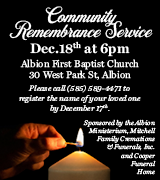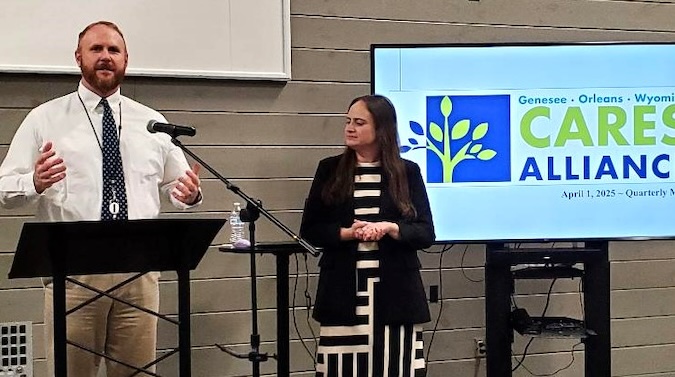GOW CARES Alliance focusing on community wellness, access to services
By Mike Pettinella, UConnectCare publicist
BATAVIA – The first quarterly meeting of the GOW CARES Alliance, formerly known as the GOW Opioid Task Force, on Tuesday afternoon illustrated the value of community partnerships in improving people’s health and well-being.
About 90 people, representing several human services’ agencies in Genesee, Orleans and Wyoming counties, attended the two-hour event hosted by Grace Baptist Church in Batavia. It was the first large public gathering of the coalition since the COVID pandemic hit in early 2020.
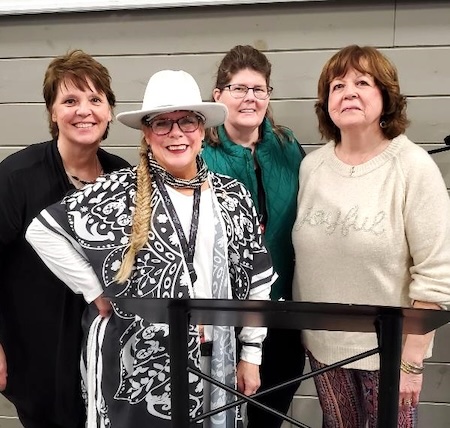
Sue Gagne, left, coordinator of the GOW CARES Alliance, with members of her team – Melissa Vinyard, Sherri Bensley and Cheryl Netter – at Tuesday’s quarterly meeting at Grace Baptist Church in Batavia.
Paul Pettit, public health director of Genesee & Orleans County Health Departments and co-chair of the alliance’s steering committee, emphasized the significance of the name change – noting that the focus has broaden from just opioid overdose deaths to include strategies to address all types of substance use, mental health issues, trauma and suicide.
“What were trying to do now with the GOW Cares Alliance is trying bring these issues together and trying to attack them as a collective,” Pettit said. “The dashboard (on the GO Health website) has links and resources for people who use drugs or are in crisis or have a family member that’s in crisis that helps lead them to services and access to care.”
Pettit said the alliance has identified three key strategies to reduce the substantial rates of overdose and suicide in the three rural counties:
• Community Centered Approach. Recognize and respond to the overall health challenges and strengths of rural communities by gauging the pulse of current trends and involving people with lived experience.
• Addressing Barriers to Access. Promoting community awareness and understanding through navigating the system, health literacy and connection to community resources; addressing stigma and equitable access, and offering safer choices and harm reduction options.
• Promotion of Holistic Care. Addressing physical, mental, social and spiritual needs.
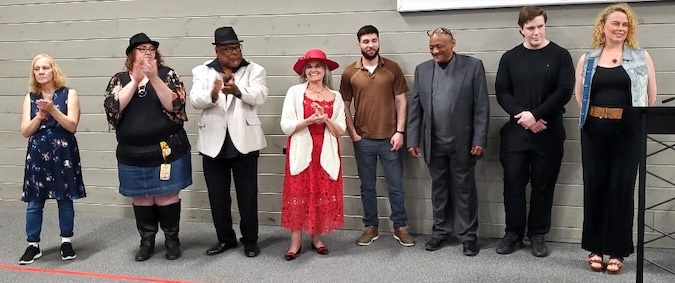
The eight “Recovery Fashion Show” participants acknowledge applause at the conclusion of the meeting.
The directors of Community Services in the three counties spoke about the role of mental health agencies in a grassroots organization such as the GOW CARES (Community Action for Recovery Education & Support) Alliance.
“It’s a team effort,” said Lynda Battaglia (Genesee County), noting that more than half of Americans are diagnosed with some type of anxiety disorder and that someone dies by suicide every 11 minutes.
She said it is incumbent upon local mental health and community services departments to “fill the gap” in services to their residents. She said that the goal is to identify the needs of the community and find out what services are needed.
Battaglia urged those in the audience to reach out to governmental leaders.
“We need to hear your voice. You are the boots on the ground,” she said. “If you have an idea for a service, I encourage you to email us.”
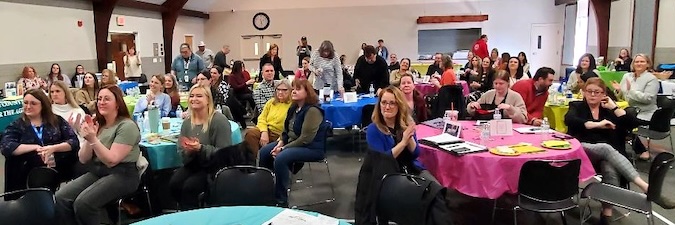
Meeting attendees express their appreciation for the fashion show entrants.
Danielle Figura (Orleans County), who also serves as the steering committee co-chair, spoke about the partnership between Genesee and Orleans counties in the mental health field.
She mentioned some of the Orleans’ initiatives such as a helpline (that reaches all three counties), fatality review board, leave behind kits for first responders and a Critical Incident Stress Management team to help those involved in traumatic events.
Kelly Dryja (Wyoming County) shared three initiatives in her county – CredibleMind, a free and confidential online platform that gathers expert-rated and vetted videos, podcasts, apps and other resources; a harm reduction vending machine in the Village of Warsaw, and a “community conversation” on combatting stigma in conjunction with the University of Rochester.
Co-chairs of the alliance’s four workgroups – Community Education, Community Trends, Resource Hub and Safer Choices – spoke briefly about their objectives, which, respectively, include meeting planning and publicity, data analysis in cooperation with law enforcement, updating a resource guide, social media platforms and website, and providing resources and products that act as a “go-between” prevention and total abstinence.
The meeting concluded with a spirited “Recovery Fashion Show,” with Melissa Vinyard, director of The Recovery Station on Clinton Street Road as the M.C. Participants wore items of clothing from the City Church Clothing Collection, which supplies clothes for all ages, plus other household items to those in need at no charge.
Four women and four men, representing 77 years of recovery, took part in the fashion show as the audience cheered in appreciation of their successful journeys.
“We at The Recovery Station do recovery loudly,” Vinyard said, “so people don’t have to die quietly, alone.”
Lunch was provided by Spectrum Human Services. Other agencies who set up tables were Independent Living of the Genesee Region, Fidelis Care, Genesee County Office for the Aging, Veterans Services and Veterans Crisis Line, Horizon, GO Health, Best Self Behavioral Health and UConnectCare.













